Oscar Wilde's Satire in The Importance of Being Earnest
- E. Deborah Kalauserang

- Dec 26, 2018
- 16 min read
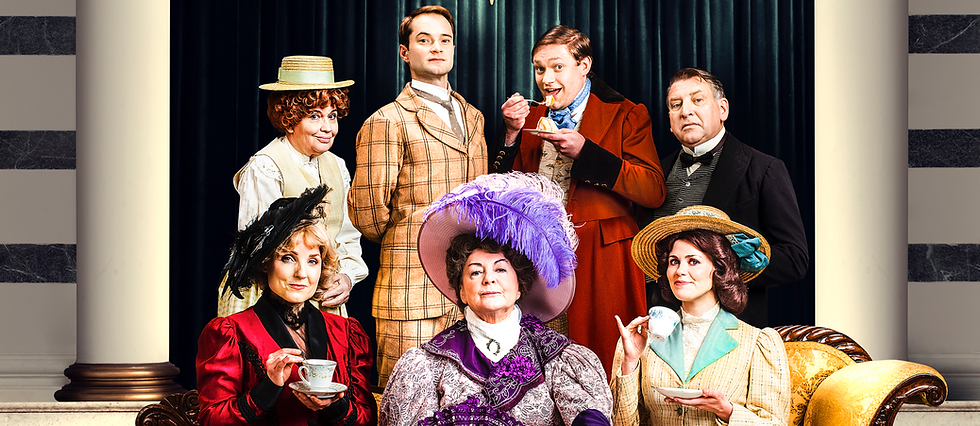
Author's Note
Dearest Readers,
Here is an article I wrote about for the History of English Literature class, an unofficial preliminary requirement for the literature major I will be taking next semester. This is a final exam paper to close my 5th semester. For your information, I had to compose three research papers, and this is one of them. My lecturer gave a requirement that our paper should be minimal 3 pages long with a 1.5 spacing (that length would be considered a B+). At first, I thought my paper would be around 5 pages long since I have other obligations on Syntax and Introduction to Research class. However, my topic on Wilde's satire was quite deep and there were so many things that I had to elaborate relating to the Victorian Era. Finally, I ended with an 11-page research paper, which I immensely enjoyed working on, compared to the rest of the two papers I had to compose ( which I will also publish here).
I am interested with the life Oscar Wilde, after I carried out a research on his life and ideologies. I think that he is a unique person, who mostly worried about his body weight and his dislike towards the fashion of prison clothes (when he was imprisoned at the end of his life for being a culprit of sodomy). He was very much a confident, sarcastic, arrogant individual and would likely to sneer with an elevated chin at people who wear H&M products instead of Dolce & Gabanna (if he were to live in this era). I do disagree with several views of his, regarding homosexuality, marriage and the measure of beauty as the centre of all things, as it was explicitly and implicitly stated in A Picture of Dorian Gray. Sometimes I laughed and could not help to shake my head as I passed several debatable lines that he wrote in A Picture of Dorian Gray and also the Importance of Being Earnest. However, I admire the works of art that he produced. He could voice his controversial ideas through his personal medium of literature, in which society enjoyed to read and criticize.
In the end, I wish that someday I can produce magnificent narratives that can express my deepest thoughts, critiques and disagreements toward particular matters. Although I consider that Wilde had led a frivolous life, he had inspired me nonetheless to maximize the influence of literature towards history. I am just glad to publish my article here and to be read by you; my efforts to sleep at 3 AM are not in vain. Enjoy!
Regards,
Deborah K.
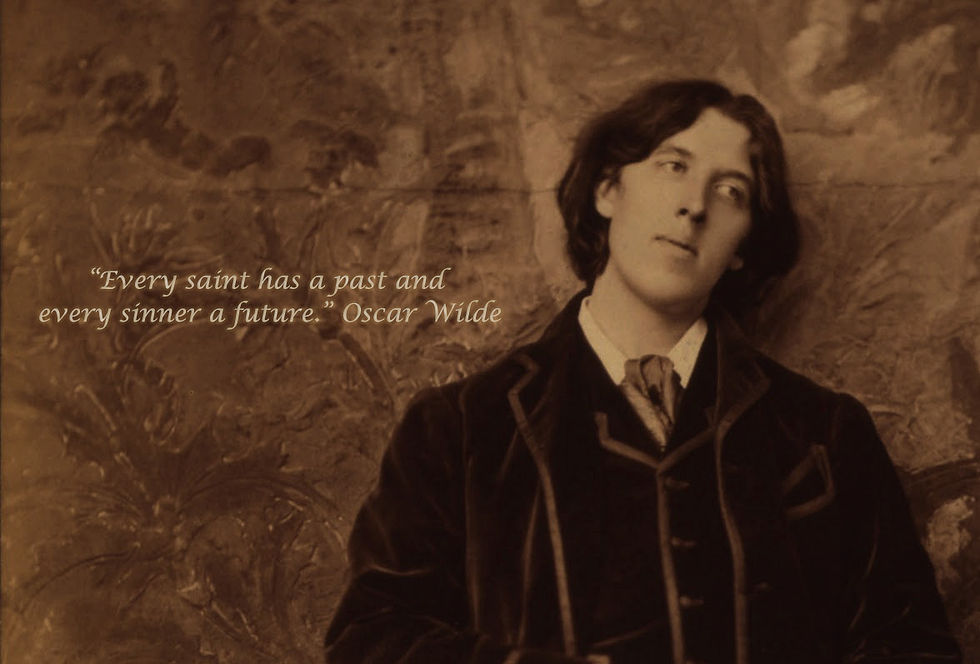
Oscar Wilde's Satire in The Importance of Being Earnest
CHAPTER I
INTRODUCTION: VICTORIAN VALUES
In the times of Queen Victoria, the British Empire reached its greatest extent. This was known as the Victorian Age. This was also the Empire’s Golden Era, where massive economic advancements and industrialization took place. In this era, Britain had her colonies almost all around the globe: India, Canada, Australia, South Africa, New Zealand, and many more. Britain did not only experience economic progress nor had a major empire expansion, but also underwent a period of strict social norms where they held their own views on essential, social aspects---known as the Victorian values.
Sexual proprietary, hard work, honesty, thrift, sense of duty and responsibility towards the less well-off were the main concerns of the Victorian values (Joshi, 2017). All of these aspects were often described by the term ‘Victorian morality’, in case one may get lost or twisted between these two interrelated terms. If one were living under these Victorian values, he or she might be solicitous in keeping up with their social status, appearance and looking after their family. This was considered as the definition of ‘respectability’ of that era. Men, the breadwinners, would be protecting women, the homemakers, who were considered as physically weaker individuals but morally divine guides and inspirers of men (Spiazzi & Travella, 2009). Words in relation with sexual connotations were also eliminated. Furthermore, women were expected to be “sexless” individuals: they were not allowed to perform any sexual conducts towards herself nor her husband, but only to be the angel of the house. They were assumed to have the desire of marriage, rather than pursuing to go after their own sexual satisfaction (Hughes, 2014). Rather than attracting a husband through their domestic abilities, middle-class girls were coached in what were known as ‘accomplishments’ (Hughes, 2014). “However, respectability was a mixture of morality and hypocrisy, since the unpleasant aspects of society -- dissolution, poverty, social unrest -- were hidden under outward respectability,” quoted Spiazzi & Travella in Only Connect...New Directions. These “unpleasant aspects of the society” included child labor and prostitution that was rampant due to the massive industrialization, as the population jumped from 16.8 million in 1851 to 30.5 in 1901 (according to the New World Encyclopedia). Alfred Lord Tennyson condensed the Victorian morality in his poem “The Princess” (1847):
Man for the field and woman for the hearth;
For the sword, and for the needle she;
Man to command, and woman to obey;
All else is confusion.

In Oscar Wilde’s renowned play The Importance of Being Earnest, A Trivial Comedy for Serious People (first performed in February 14, 1895), these so-called “victorian morality” were criticized greatly. Through this particular play, Wilde implicitly argued that these values were just a fake mask to display how educated and accomplished the Victorian people were, while in reality their culture was filled with void. As Nietzsche stated in the theory of nihilism, it was truly the emptying of culture and meaninglessness. To explain this idea in a simple way, it can be said that the Victorian morality resembles an antique china vase. The design of the vase may be exquisite and colorful, perhaps even worth million dollars. However, when one takes a closer look, the vase is hollow inside. Its sharp pieces can even hurt a person when it is thrown at him or her on purpose. Wilde criticized the Victorian era that permitted their youths to lead double lives like Earnest and Algernon did. This will be explained further in the last section.
CHAPTER II
HISTORICAL BACKGROUND OF VICTORIAN AGE
Alexandrina Victoria was a young girl of 18 when she first ascended to the throne as a monarch to govern United Kingdom of Great Britain and Ireland on June 20, 1837. Later she would know that her 64-year reign would make a major influence towards the globe and gave rise to a significant period for her nation. Thus, her reign was eventually known as the Victorian Age.
If one were living in the times of Victorian England, they would surely experience the acceptance of middle class morality. They also would surely be expected to carry out the values of respectability (as briefly explained in the previous passage). Education, hygiene, philanthropy and good manners were taught. If that person is a female, she would be assumed to hold high the idea of female chastity which gave the understanding that being a single mother would be surely be marginalized the community and considered as a ‘fallen woman’. If that person is a male, he must be able to manage himself with self-restraint and avoid every little thing that was associated to anything sexual. Eventually, men and women were considered to be living in separate spheres, or to say, separate worlds. As Kathryn Hughes quoted in Gender Roles in the 19th Century:
The ideology of Separate Spheres rested on a definition of the ‘natural’ characteristics of women and men. Women were considered physically weaker yet morally superior to men, which meant that they were best suited to the domestic sphere. Not only was it their job to counterbalance the moral taint of the public sphere in which their husbands laboured all day, they were also preparing the next generation to carry on this way of life.
Thus, everything that one performed must be according to the manners and decorum of that time, with Queen Victoria, Prince Albert and their nine children as the role model.

The complexity of this era was not only occupied with rigid rules of living, but also the distinct gap of the social classes as well. There were three social divisions: the upper class, middle class and lower class. The upper people were descendants of nobility. This particular class was marked with the characteristic of being materialistic, appearance-oriented and idle people who loathed the idea of working for living. It was contrary with the middle class people who were mostly self employed. It was also believed that the middle class was founded on the ideology that a man has to work hard both as contribution and catalysis towards the proliferation of the economic industry (Spiazzi & Travella, 2009). These people were doctors, professors, manufacturers, etc. The last one was the people who did all the ‘dirty’ jobs: the lower class. They were chimney sweepers, errand children, factory workers, etc. Sometimes, society generally would also associate the lower-class women with prostitutes (or ‘fallen women’), as depicted in Sarah Daniel’s play The Gut Girls when Maggie (a gut girl) was almost sexually assaulted by Edward (an upperclassman).
For the people living in the Victorian Age, it was impossible to climb up to the higher level of social class. Instead, they accepted their fate---the social class in which they were born into.
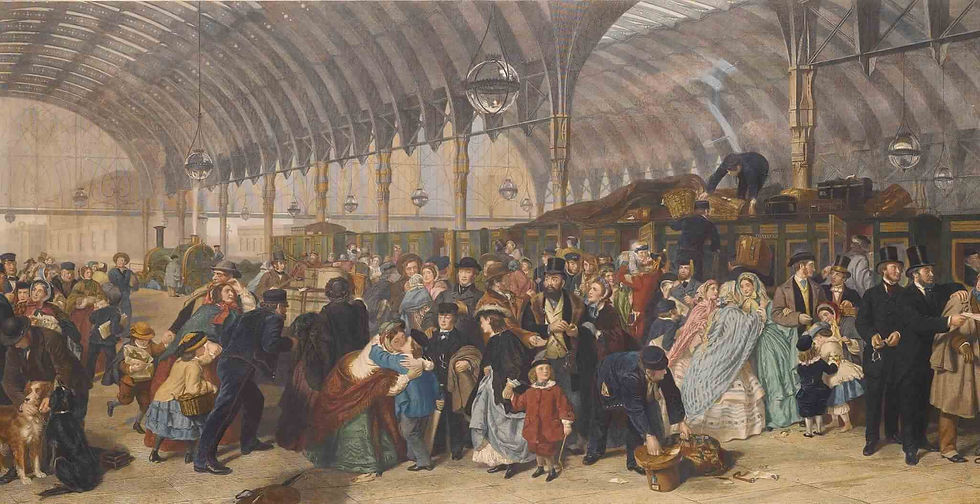
Economics, inventions and politics made great progress. The population of the Victorian England doubled. The urban and industrial expansion caused housing to be inadequate and rapidly became slums with little hygiene and a high mortality rate: often whole families shared one room with no running water, and toilets were communal pits (Spiazzi & Travella, 2009). Child labor was in its peak, as reflected in the works of Charles Dickens’ Oliver Twist (1837-39) and Frances Hodgson Burnett’s A Little Princess (1888). Most children did not only work as chimney sweepers, but also coal miners, errand boys and girls, shoeblacks or flowersellers. Orphans, as the consequence of the high rate of prostitution, were scattered all over the place and most likely turned into criminal gangs. One of the reasons why the Victorian Age which lasted from 1837 to 1901 is so well known and remembered is for the inventions which took place during this period: things which are used in one’s daily life are a product of the Victorian inventions (Joshi, 2017). Inventions were found, such as railways to lower the cost of traveling and anesthesia to reduce the pain in surgery. Thomas Alfa Edison invented the electric bulb (1879), Alexander Graham Bell devised the telephone (1879), John Horsely made Christmas cards and William Cooke with Charles Wheatstone innovated photographs. In addition, politics were filled with significant events. The Great Exhibition of the Works of Industry of All Nations took place in Hyde Park in 1851. The Crimean War exploded in 1853-56, with Florence Nightingale . The Second Reform Act extended the right to vote to some sections of the working class. Education Act was established as the basis of elementary education (1870). The Victorian England continued to flourish and expand its empire, as the Queen became the Empress of India in 1877. This was 24 years before the death of Alexandrina Victoria, once a girl of 18 who ascended to the throne.
CHAPTER III
A BRIEF VIEW OF THE IMPORTANCE OF BEING EARNEST
Meanwhile, on the other side of Britain, a boy named Oscar Fingal O'Flahertie Wills Wilde was born in Dublin, Ireland, 1854. Wilde was born in the middle of the puritanical, repressive Victorian Era when the Crimean War erupted. His father was a surgeon and his mother an elegant woman, who once dressed up the toddler Wilde as a long-desired baby girl. He was a genius in the family and a gifted child with a talent to write. Wilde was considered as a prodigy because of his ability to read a three-volume novel in half an hour and retold the accurate plot. Within one-hour reading, he was able to recount the “fair narrative of the incidental scenes and the most pertinent dialogue,” as Wilde claimed. Wilde despised sport and violence, and summed up his feelings about both activities in the following remark, taken from his play A Woman of No Importance (1893): “The English country gentleman galloping after a fox: the unspeakable in pursuit of the uneatable” (McCauley, 2003). In 1873, he went to Trinity College, Dublin to study classics under the umbrella of scholarship at the age of 18. Several years later, he won the highest mark for Oxford scholarship to continue his study for classics. He began writing his works. Among them were Vera (his first play which was rejected by London and New York producers), A Picture of Dorian Gray (publicly criticized for its homosexuality theme) and The Importance of Being Earnest. Thus, began the journey of his extravagant lifestyle as a flamboyant dandy, master of witty conversations, member of freemason, homosexual, literary genius, renowned poet and a successful playwright who satirically criticized the Victorian morality of his time.

The Importance of Being Earnest retold the story of two men leading a double life, both under the name ‘Earnest’. Jack, the main character, was fond of Gwendolen Fairfax, the daughter of an aristocrat Lady Bracknell living in the urban city of London. Jack made up a story to his beautiful ward in the countryside, Cecily, that he had to visit his metropolitan brother named Earnest in London, because this so-called ‘Earnest’ was described as a little bit of troublemaker. However, Cecily was mesmerized and curious with the made-up name ‘Earnest’. Jack quite enjoyed being Earnest, and Algernon (a friend of Jack) found the idea amusing, since Algernon himself also had an imaginary countryside friend ‘Bunbury’. Algernon often made Bunbury as an excuse to escape from his urban mundane as well like Jack did with the name Earnest. Jack made a deal with Algernon. If Jack succeeded to propose to Gwendolen Fairfax, Algernon’s cousin, then Algernon would have dinner with Jack to excuse him from having dinner with his aunt Augusta (Lady Bracknell). Gwendolen was very ecstatic to be proposed by an Earnest (who was actually Jack), and immediately declared her love for him, just because of his name: “ ‘Jack’...No, there is very little music in the name Jack, if any at all indeed. The only really safe name is Earnest,” (Wilde, 537). Unfortunately, Aunt Augusta bursted into the room in the middle of the proposal. She did an ‘instant’ check on Earnest (a.k.a Jack), and demanded him to “produce” at least one parent. It was caused by the fact that Jack was an orphan, abandoned at the Victoria station inside a handbag. The similar thing occurred Algernon. Algernon copied Jack’s countryside address as Gwendolen asked for it (before she left his place), and decided to go visit Jack’s young ward Cecily who was under the guidance of the governess, Miss Prism. When Algernon arrived, he introduced himself as Jack’s made-up brother, Earnest. Cecily too, found that the name ‘Earnest’ attractive as Gwendolen did. Jack arrived back at the countryside with the news that his brother Earnest passed away. However, when he found out that Algernon was there under the same name ‘Earnest’, Jack was furious. They both went to the church to meet Dr. Chasuble, the local reverend, (at separate times) to arrange the christening of their names. Meanwhile, it turned out that Gwendolen came to visit Jack, but met Cecily instead. Cecily and Gwendolen had a dispute, thinking that both were engaged to the same Earnest. Algernon and Jack arrived at the sight of the two confused women. After a brief explanation from the two men, it dawned on the women that there was no actual Earnest. The ladies went into the house, leaving the men in argument and frustration. The men finally apologized to the women, revealing their true intentions was only to see them. The women forgave them. Unfortunately, in the midst of their joy, Lady Bracknell appeared and saw Cecily holding hands with Algernon, her nephew. She immediately inquired about Cecily’s background, including her inheritance. Suddenly, Lady Bracknell’s attitude changed towards Cecily, knowing that this girl had so much fortune. Lady Bracknell gave her sudden consent to Algernon and Cecily to marry. Here was the part that Jack played. As Cecily’s guardian, Jack did not allow his ward to marry, except if Lady Bracknell also gave her consent to him and Gwendolen to marry. Precisely in time, Dr. Chasuble went into the room to inform that the christening was ready to take place. Suddenly, Lady Bracknell’s ears rung a bell at the name of Miss Prism mentioned by Dr. Chasuble. She commanded for Miss Prism to be summoned. It turned out that long ago, Miss Prism worked for Lady Bracknell and was assigned to take care of a baby. When Miss Prism was reading for leisure, she mistaken the book as the baby. As a result, she put the book into the stroller and baby into the handbag. She left the handbag at Victoria station. It was confirmed with the old handbag that Jack still kept, the very handbag that belonged to Miss Prism long ago. At first, Jack thought that his mother was Miss Prism. Actually, as Lady Bracknell explained, Jack’s mother was Mrs. Moncrieff. That made Jack Algernon’s older brother. Jack was named after his father, as told by Lady Bracknell. Because they all couldn’t recall what exactly Mr. Moncrieff’s name was, they looked it up in the book of Army Lists (since Mr. Moncrieff was a general). Finally, the book unrevealed that Mr. Moncrieff’s name was Earnest---and it means that Jack’s name was also Earnest. In the end, Jack declared that he now knows the importance of being Earnest: to live a genuine life.
CHAPTER IV
SATIRE ON VICTORIAN VALUES
IN THE IMPORTANCE OF BEING EARNEST
According to Megan LeBoeuf in her journal The Power of Ridicule: An Analysis of Satire (2007), satire is defined as “a powerful art form which has the ability to point out the deficiencies in certain human behaviors and the social issues which result from them in such a way that they become absurd, even hilarious, which is therefore entertaining and reaches a wide audience. Satire also has the ability to protect its creator from culpability for criticism, because it is implied rather than overtly stated; in this way, it becomes a powerful tool for dissenters in difficult or oppressive political and social periods.” In another way, satire is meant to criticize or point out the ‘stupidity’ of certain things or people with the means of laughter. The satirists are to warn the people that something is wrong within the society. “Satire cannot function without a standard against which readers can compare its subject,” argued Quintero in A Companion to Satire (2007). Plainly, satirists have resemblance with the responsibility of a watchdog: to arouse the people of the burning barn and that the fire needs to be extinguished. “In the plain light of public scrutiny,” he continued, “the satirist would contend, there should appear nothing wrong, if, really, there is nothing wrong.”
In the case of The Importance of Being Earnest, Wilde used humor to express his dislike towards the Victorian values of his time and poured out his critiques in the form of farce and epigrams through his characters. He succeeded to make his Victorian audiences laughed at the ‘stupidity’ of their own views of values by creating a distance between the story and the audience (McCauley, 2003). Since The Importance of Being Earnest talked about how two women falling in love with two men who pretended to be named ‘Earnest’, Wilde mostly attacked the Victorian values of what a marriage is, and how love is determined on the basis of materialism and social status.
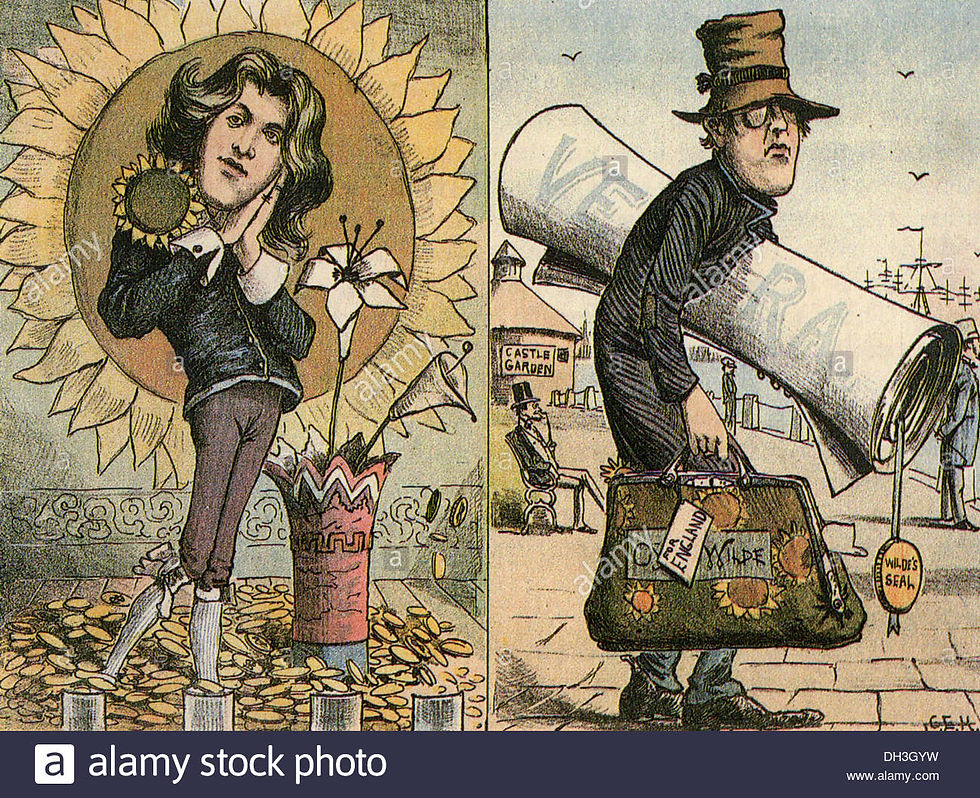
Wilde’s distaste of the Victorian morality was reflected in his characters. "Morality is simply the attitude we adopt towards people whom we generally dislike," quoted Wilde. For Lady Bracknell, it was the orphans and the lower class whom she truly despised:
You can hardly imagine that I and Lord Bracknell would dream of allowing our only daughter—a girl brought up with the utmost care—to marry into a cloak-room, and form an alliance with a parcel? Good morning, Mr. Worthing!
Lady Bracknell’s measure of marriage was not on the basis of love, but on the basis of how ‘aristocrat’ is one to have noble connections and alliances. Her measure was not on the basis of freedom of choice either, like what Gwendolen had for Jack (although in the beginning Gwendolen was awfully attracted with the musical name ‘Earnest’).
Wilde made further attacks on the general view of the Victorian values and respectability. As Alfred Lord Tennyson cited in his poem “The Princess” (1847), the role of man was “to command” and women “to obey”. However, Wilde made fun of the idea by creating several inversions in his play. The women, Gwendolen and Cecily, steered their own ship to determine the course of their love life. They were unlike the Victorian-day women who “should be informed of the fact” of their engagement by their parents, the matter that she was “hardly... allowed to arrange for herself,” as lectured by Lady Bracknell. The notion of this inversion was also elaborated wittily by Algernon’s controversial statement which confronted the saying “marriages are made in heaven”: divorces are made in heaven. The married Wilde took this contextual opportunity to suit his own purposes of his homosexuality affair with the young poet Lord Alfred Douglas (or ‘Bosie’), hence declaring in his play that “in marriage, three is company, two is none,” in contrary with the popular saying “two is company, three is a crowd.”
Finally, the most essential part in Wilde’s satirical masterpiece, The Importance of Being Earnest, lies on the name of ‘Earnest’ itself. It is somehow an irony that ‘Earnest’ means to live one’s live sincerely with conviction; free from any hints of pretense. However, Jack and Algernon had to live a double life in order to win the women’s hearts, just because ‘Earnest’ earned an unfortunate, earnest, superficial “love” earnestly. Thus, the Victorian way of living multiple lives was being sarcastically laughed at (ironically, by the Victorians themselves) as Cecily said this line to Algernon, “I hope you have not been leading a double life, pretending to be wicked and being really good all the time. That would be hypocrisy.”
These dialogues were only several out of many cases in which Wilde made his “attack on Victorian society, in particular on its social and moral hypocrisy, the social class system”
and “the attitude of marriage as a social tool, and the triviality of aristocratic life” (McCauley, 2003).
CHAPTER V
CONCLUSION
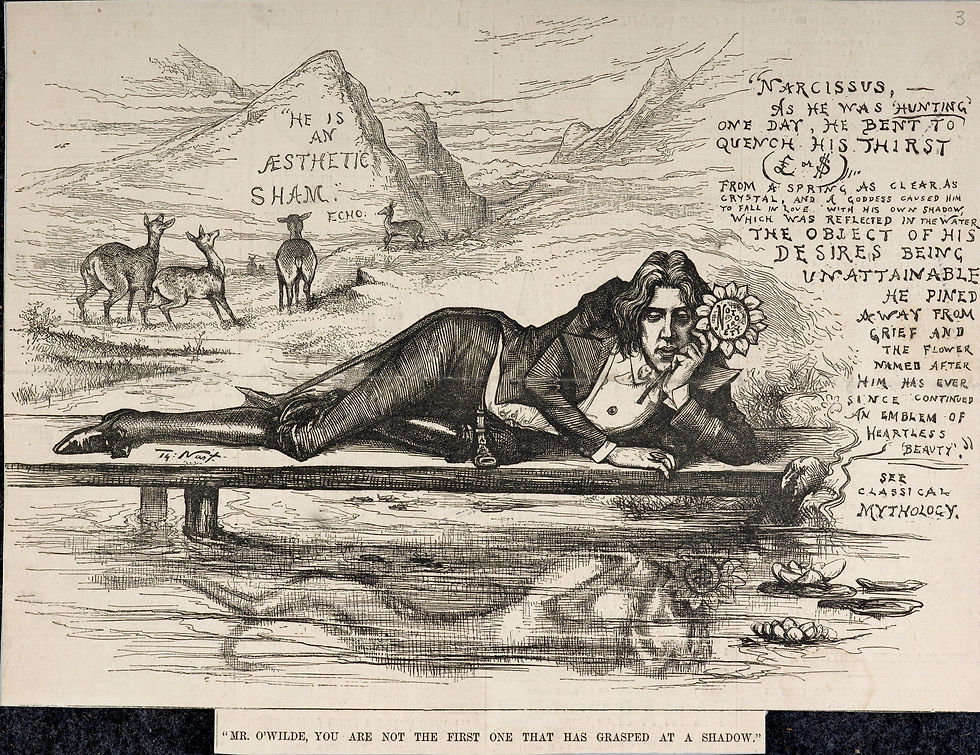
In conclusion, The Importance of Being Earnest was a mirror to arouse the Victorians that the values they held in the society was the true definition of vanity. Through this satirical narrative, Oscar Wilde exposed the void amidst the flourishing culture of the Victorian Age. Fools were being looked upon, as mirrored by Dr. Chasuble. The innocents were not as they seemed to be, as what happened to Miss Prism. Love and marriage were measured upon
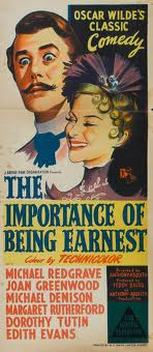
triviality, as what was done by Gwendolen and Cecily. Leading double lives was considered to be the normality, as demonstrated by Earnest and Algernon. Most importantly, judgement on the other was unconsciously made upon oneself: as Lady Bracknell judged Earnest, a part of her own blood, and as the Victorians ironically laughed upon Wilde’s characters, the actual representatives of their society itself.
The Importance of Being Earnest pointed out the terrible consequences that would befall one when they were not living their identity genuinely---precisely, leading a double life. In the end of this trivial comedy for serious people, Jack learned to live an earnest life. Unfortunately, Oscar Wilde did not. Alone, penniless, and suffering from syphilis, Wilde passed away in 1900 in Paris in a cheap hotel room as a father of two, a homosexual affair partner and a sodomy culprit.
From hundreds of satirical lines Wilde had written, there was only one thing to be pondered upon as the moral of his parody: the rake is a fake, girlish innocence is the bait of a monstrous mantrap, the wages of sin is matrimony (Foster, 1956).
***
References
Biographics. (2017, December 5). Oscar Wilde Biography: His “Wild” Life
[Video file]. Retrieved from December 13, 2018, from https://www.youtube.com/watch?v=njSSCBjnsbU.
Elliott, Charles. (1998, March 20). What Killed Oscar Wilde?. Retrieved December 16, 2018, from https://www.nytimes.com/1988/03/20/books/l-what-killed-oscar-wilde-315488.html.
Foster, Richard. (1956). Wilde as Parodist: A Second Look at The Importance of Being Earnest. College English, Vol. 18, (1) 18-23.
Hughes, Kathryn. (2014, May 15). Gender Roles in The 19th Century. Retrieved December 12, 2018, from
Joshi, Vaijayanti. (2017). Victorian Era Morality & Facts: Moral Behavior, Values, Ideals, Ethics. Retrieved December 11, 2018, from http://www.victorian-era.org/victorian-era-morality.html.
LeBoeuf, Megan. (2007). Power of Ridicule: An Analysis of Satire. Senior Honors Projects. Paper 63. Retrieved December 15, 2018, from http://digitalcommons.uri.edu/srhonorsprog/63http://digitalcommons.uri.edu/srhonorsprog/63.
McCauley, Brigid. (2003, December 30). The Life and Works of Oscar Wilde . Retrieved December 13, 2018, from http://www.skoletorget.no/abb/eng/wilde/ow.html.
Quintero, Ruben. (Ed.). (2007). A Companion to Satire. Malden, Massachusetts: Blackwell Publishing Ltd.
Shmoop Editorial Team. (2008, November 11). The Importance of Being Earnest Summary. Retrieved December 14, 2018, from https://www.shmoop.com/importance-of-being-earnest/summary.html.
Spiazzi, Marina & Travella, Marina. (2009). Only Connect...New Directions. Bologna, Italy: Zanichelli.
UK Essays. (2016, December 5). Satire in The Importance of Being Earnest: English Literature Essay. Retrieved December 11, 2018, from https://www.ukessays.com/essays/english-literature/satire-in-the-importance-of-being-earnest-english-literature-essay.php.
Wilde, Oscar. (1952). The Importance of Being Earnest. London, United Kingdom:
Methuen & Co. Ltd.




Comments